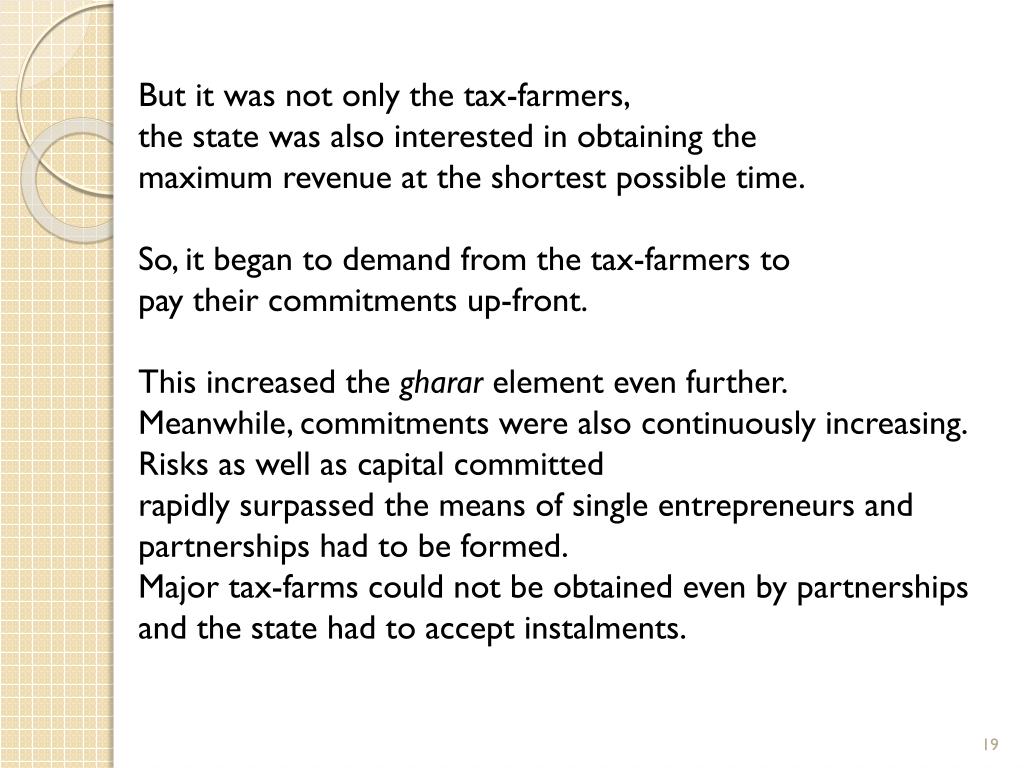Tax Farmers Ap World History Definition Test Review Ppt Download
Understanding tax farmers is essential for navigating the complexities of ap world history. Definition of tax farming in world history. The zamindari system was a land revenue system in british india that allowed zamindars, or landowners, to collect taxes from peasants in exchange for land ownership rights.
The Tax Farmer Ethics (Manipulating The Tax Slaves) FAIM HUB
Tax farming occurred in eygpt, rome, great britain, and greece. But what is tax farming, and how did it. Under this system, the state transfers the right of collection to private individuals or to groups ot.
The money for the subsidies were.
It is often linked to the abuse of state power and. Tax farmers a system for collecting taxes and other state revenues from the population. Zamindars were landowning elites in south asia, particularly during the mughal empire, who acted as intermediaries between the peasants and the central government. These contracted parties, known as tax farmers,.
The demand and resulting prosperity encouraged bigger farms to invest in the most recent technological advances. People would bid for the right to collect taxes and would even keep part of the revenue. Tax farmers paid specific taxes, such as custom duties, in advance in return for the privilege of collecting a greater amount from the. Hiring a third party to collect taxes.

Men national dress Black and White Stock Photos & Images Alamy
Modern definition a special tax refers to a financial levy imposed by governments, often targeting specific groups or purposes, that serves as a significant source.
Tax farming occurred in eygpt, rome, great britain, and. Study with quizlet and memorize flashcards containing terms like technology, textiles, schism/doctrinal differences and more. Mughal emperor appointed tax officers or zamindars to collect taxes from the peasant class based on land and production. As we delve into the world of commerce and governance in ap world history, the term tax farming is likely to make an appearance.
What is tax farming and explain it. A system for collecting taxes and other state revenues from the population. Tax farming, a prevalent practice in world history, involves the outsourcing of tax collection to private individuals or companies. Under this system, the state transfers the right of collection to private individuals called tax farmers in exchange for a.

The Tax Farmer Ethics (Manipulating The Tax Slaves) FAIM HUB
In this article, we will delve into the concept of tax farming, its history, and its significance in the context of ap world history.
Similar to the contemporary concept of privatization, tax farming is a poorly understood phenomenon in middle eastern history. Tax farming created other new pressures. The principle of assigning the responsibility for tax revenue collection to private citizens or groups historical significance: The principle was considered very effective for tax revenue collection but suffered from a tendency of the tax.
Tax farming, a historical practice whereby private individuals or companies collected taxes on behalf of governments, played a crucial role in ap world history.

PPT GHARAR IN PUBLIC FINANCE AND THE ORIGINS OF SUKUK 15001800

Test Review. ppt download

Land Tenure and Taxation in British India c. 1856